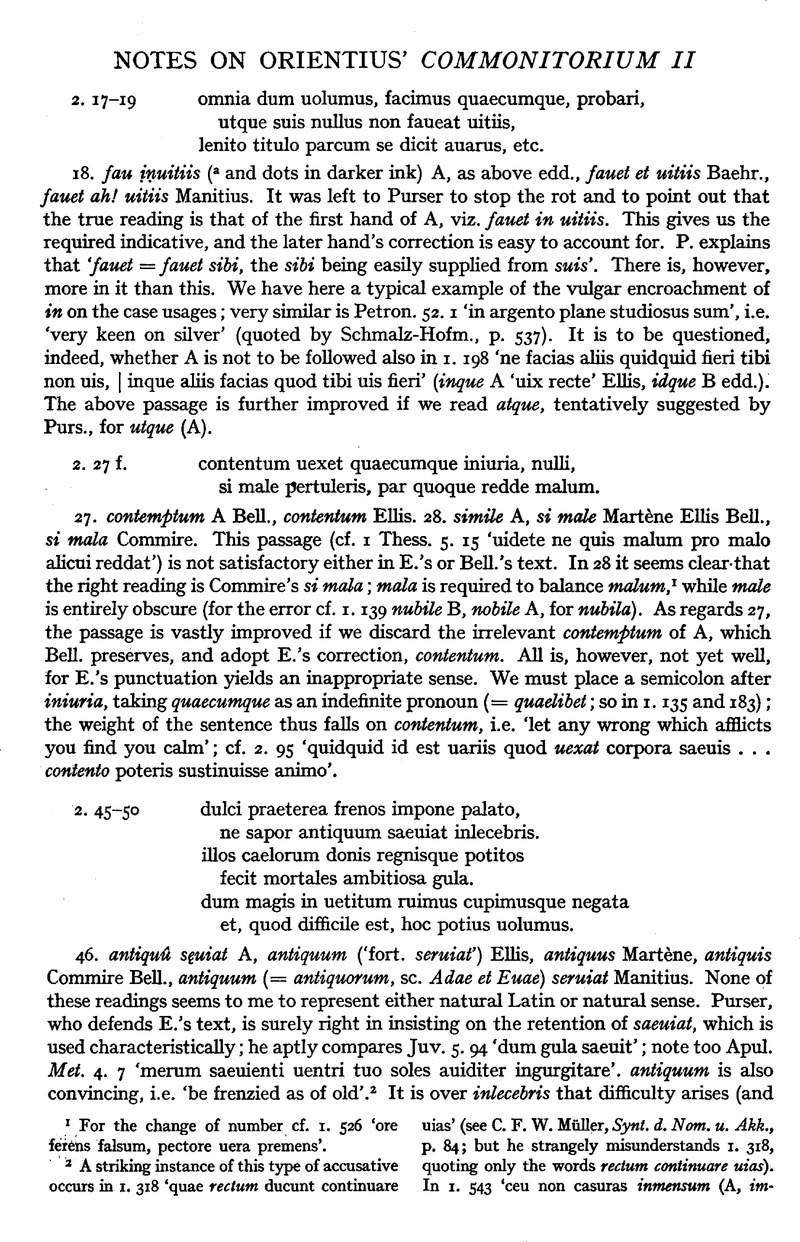No CrossRef data available.
Published online by Cambridge University Press: 11 February 2009

page 25 note 1 For the change of number cf. 1. 526 ‘ore ferens falsum, pectore uera premens’.
page 25 note 2 A striking instance of this type of accusative occurs in 1. 318 ‘quae rectum ducunt continuare uias’ (see Müller, C. F. W., Synt. d. Norn. u. Akk., p. 84Google Scholar; but he strangely misunderstands I. 318, quoting only the words rectum continuare uias). In 1. 543 ‘ceu non casuras inmensum (A, immensas B) construis arces’ we must surely take inmensum with casuras, i.e. ‘doomed to suffer a prodigious fall’ (cf. , Hor.Od. 2. 10. 10Google Scholar‘celsae grauiore casu | decidunt turres’), not, as Ellis suffer Bell. Müller (I.c., p. III) and the Thes. evidently take it, with construis.
page 27 note 1 Cf., however, Luc. 7.617 ‘in funere mundi’ = ‘at the death of a world’.
page 28 note 1 Still less does Baehr.'s remarkable achievement his latnentatum lamna, considered by Bell. ‘une lecon assez ingenieuse’.
page 28 note 2 See last note.
page 28 note 3 O. is fond of such antitheses: cf. I. 174 ‘(lex) uno quae cunctis prospicit officio’, 484 ‘unius innumerum crimen auaritiae’, 2.192 ‘et quae peruarias mors ruit una uias’, 286 ‘non…excipient Bell, unam crimina multa necem’, 354 ‘una in diuersisuox erit agminibus’.
page 28 note 4 This he finds himself able to translate by ‘celui dont la main se sera souillée d'un meurtre, celui dont la langue aura été prompte à 1'injure’.
page 29 note 1 Athenaeum, Studií periodici di letteraiura e storia, Pavia, , Universita, R., vi (1928), pp. 41 fGoogle Scholar.
page 29 note 2 Correct Cic. Att. 4. 5. 3 to 4. 3. 5 (inertinobili) in , Kühn.-Steg. i. 226Google Scholar.
page 29 note 3 Aetna 625 ‘uel solis parsura piis’, quoted as an instance by Galdi, is not parallel; in the latter case the attributive adjective is a quasi-numeral and its attachment to a substantival adjective is much less noteworthy (see Kühn.-Steg. l.c.).
page 29 note 3 The meaning assigned to it by Bell., viz. ‘a l'instant même’, is indeed the meaning required; but it is not one possessed by tunc, and it is tunc which stands in his text.
page 30 note 1 Since writing this article I have found that nunc was in fact conjectured by , Baehr. in Fleckeisen's, Jakrbb. f. Phil. u. Pädag. cxxxvii, 1888, p. 395Google Scholar.